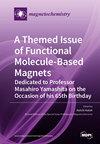单核和双核乙酰丙酮钌(III)与氯或硫氰酸配体配合物的合成、结构和性质
IF 2.6
4区 化学
Q2 CHEMISTRY, INORGANIC & NUCLEAR
引用次数: 0
摘要
合成了反式-Ph4P[RuIII(acac)2Cl2](1)、Ph4P[{RuIII(acac)Cl}2(μ-Cl)3](2)和反式-Ph4P[RuIII(acac)2(NCS)2]-0.5C6H14(3-0.5C6H14)单核和双核钌(III)配合物。通过从 DMF 中重结晶 1 和 2-H2O 以及从乙腈中重结晶 3-CH3CN,获得了适合进行 X 射线晶体结构分析的 1、2-H2O 和 3-CH3CN 单晶。通过结构分析,确认了带有双螯合酸-酰基配体和轴向氯或κ-N-硫氰基配体的八面体 Ru(1 和 3-CH3CN),以及三µ-氯桥双核 Ru2(2-H2O)。2-H2O 的 Ru-Ru 距离为 2.6661(2),表明存在直接的金属-金属相互作用。1 和 3-0.5C6H14 的室温磁矩(μeff)分别为 2.00 和 1.93 μB,2 为 0.66 μB。随温度变化(2-300 K)的磁感应强度表明,二核内的钌(III)离子之间存在着强烈的反铁磁相互作用(J ≤ -800 cm-1)。在 298 K 时于 CDCl3 中测量的 1H NMR 光谱中,双核复合物 2 显示的 acac 配体质子信号分别为 2.50 和 2.39 ppm(CH3)以及 5.93 ppm(CH),而 1 和 3-0.5C6H14 显示出顺磁性偏移较大的信号;1 为 -17.59 ppm(CH3)和 -57.01 ppm(CH),3-0.5C6H14 为 -16.89 和 -17.36 ppm(CH3)和 -53.67 和 -55.53 ppm(CH)。在含有 nBu4N(ClO4) 电解质的 CH2Cl2 中进行的循环伏安图显示,1 的 RuIII → RuIV 氧化还原波为 0.23 V(相对于 Fc/Fc+),1 的 RuIII → RuII 波为 -1.39 V,3-0.5C6H14 为 -1.25 V,2 的 RuIII-RuIII → RuIII-RuIV 和 RuIII-RuIII → RuIII-RuIV 波为 0.91 V 和 -0.79 V。本文章由计算机程序翻译,如有差异,请以英文原文为准。
Syntheses, Structures, and Properties of Mono- and Dinuclear Acetylacetonato Ruthenium(III) Complexes with Chlorido or Thiocyanato Ligands
The mononuclear and dinuclear ruthenium(III) complexes trans-Ph4P[RuIII(acac)2Cl2] (1), Ph4P[{RuIII(acac)Cl}2(μ-Cl)3] (2) and trans-Ph4P[RuIII(acac)2(NCS)2]·0.5C6H14 (3·0.5C6H14) were synthesized. Single crystals of 1, 2·H2O and 3·CH3CN suitable for X-ray crystal structure analyses were obtained through recrystallization from DMF for 1 and 2·H2O and from acetonitrile for 3·CH3CN. An octahedral Ru with bis-chelate-acac ligands and axial chlorido or κ-N-thiocyanido ligands (for 1 and 3·CH3CN) and triply µ-chlorido-bridged dinuclear Ru2 for 2·H2O were confirmed through the structure analyses. The Ru–Ru distance of 2.6661(2) of 2·H2O is indicative of the existence of the direct metal–metal interaction. The room temperature magnetic moments (μeff) are 2.00 and 1.93 μB for 1 and 3·0.5C6H14, respectively, and 0.66 μB for 2. The temperature-dependent (2–300 K) magnetic susceptibility showed that the strong antiferromagnetic interaction (J ≤ −800 cm−1) is operative between the ruthenium(III) ions within the dinuclear core. In the 1H NMR spectra measured in CDCl3 at 298 K, the dinuclear complex 2 showed signals for the acac ligand protons at 2.50 and 2.39 ppm (for CH3) and 5.93 ppm (for CH), respectively, while 1 and 3·0.5C6H14 showed signals with large paramagnetic shifts; −17.59 ppm (for CH3) and −57.01 ppm (for CH) for 1 and −16.89 and −17.36 ppm (for CH3) and −53.67 and −55.53 ppm (for CH) for 3·0.5C6H14. Cyclic voltammograms in CH2Cl2 with an electrolyte of nBu4N(ClO4) showed the RuIII → RuIV redox wave at 0.23 V (vs. Fc/Fc+) for 1 and the RuIII → RuII waves at −1.39 V for 1 and −1.25 V for 3·0.5C6H14 and the RuIII–RuIII → RuIII–RuIV and RuIII–RuIII → RuIII–RuIV waves at 0.91 V and −0.79 V for 2.
求助全文
通过发布文献求助,成功后即可免费获取论文全文。
去求助
来源期刊

Magnetochemistry
Chemistry-Chemistry (miscellaneous)
CiteScore
3.90
自引率
11.10%
发文量
145
审稿时长
11 weeks
期刊介绍:
Magnetochemistry (ISSN 2312-7481) is a unique international, scientific open access journal on molecular magnetism, the relationship between chemical structure and magnetism and magnetic materials. Magnetochemistry publishes research articles, short communications and reviews. Our aim is to encourage scientists to publish their experimental and theoretical results in as much detail as possible. Therefore, there is no restriction on the length of the papers. The full experimental details must be provided so that the results can be reproduced.
 求助内容:
求助内容: 应助结果提醒方式:
应助结果提醒方式:


